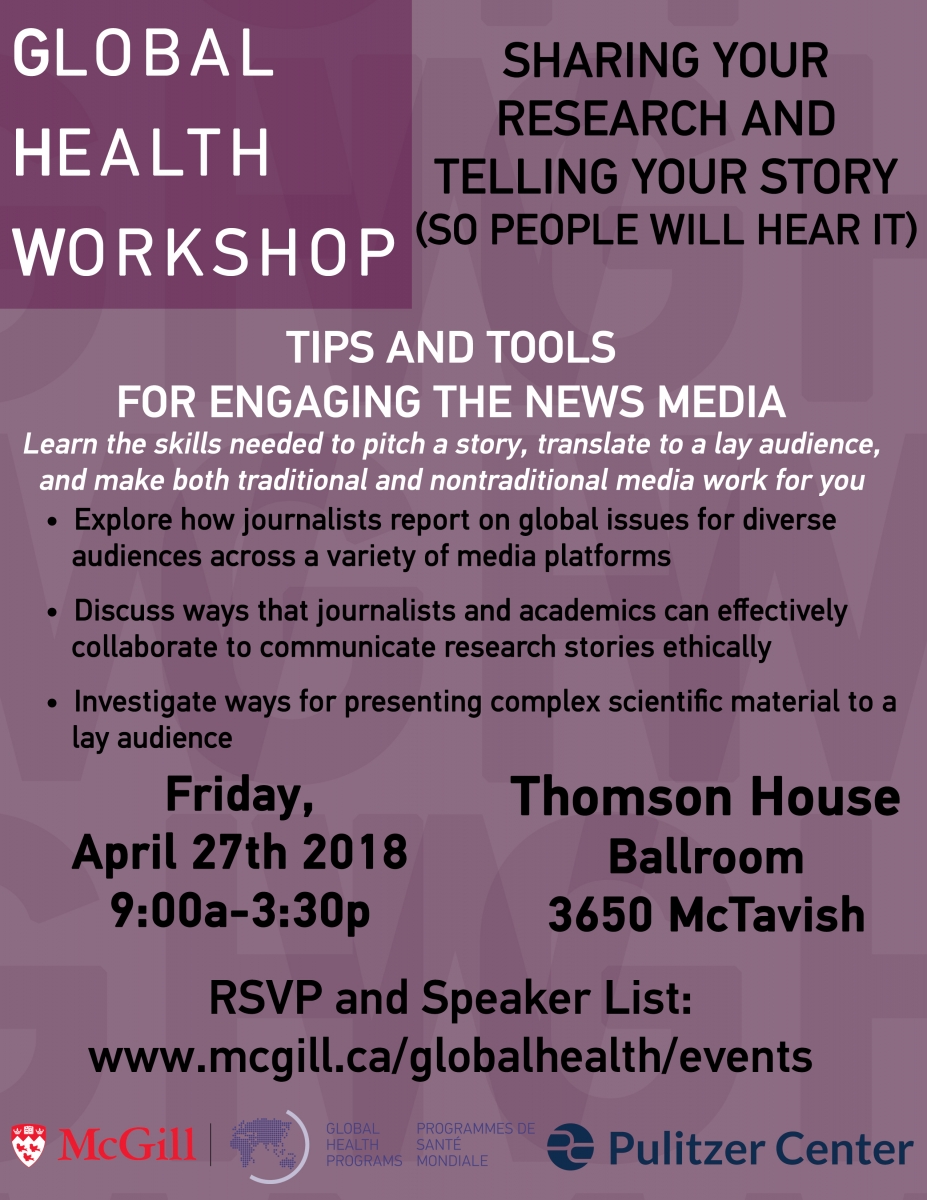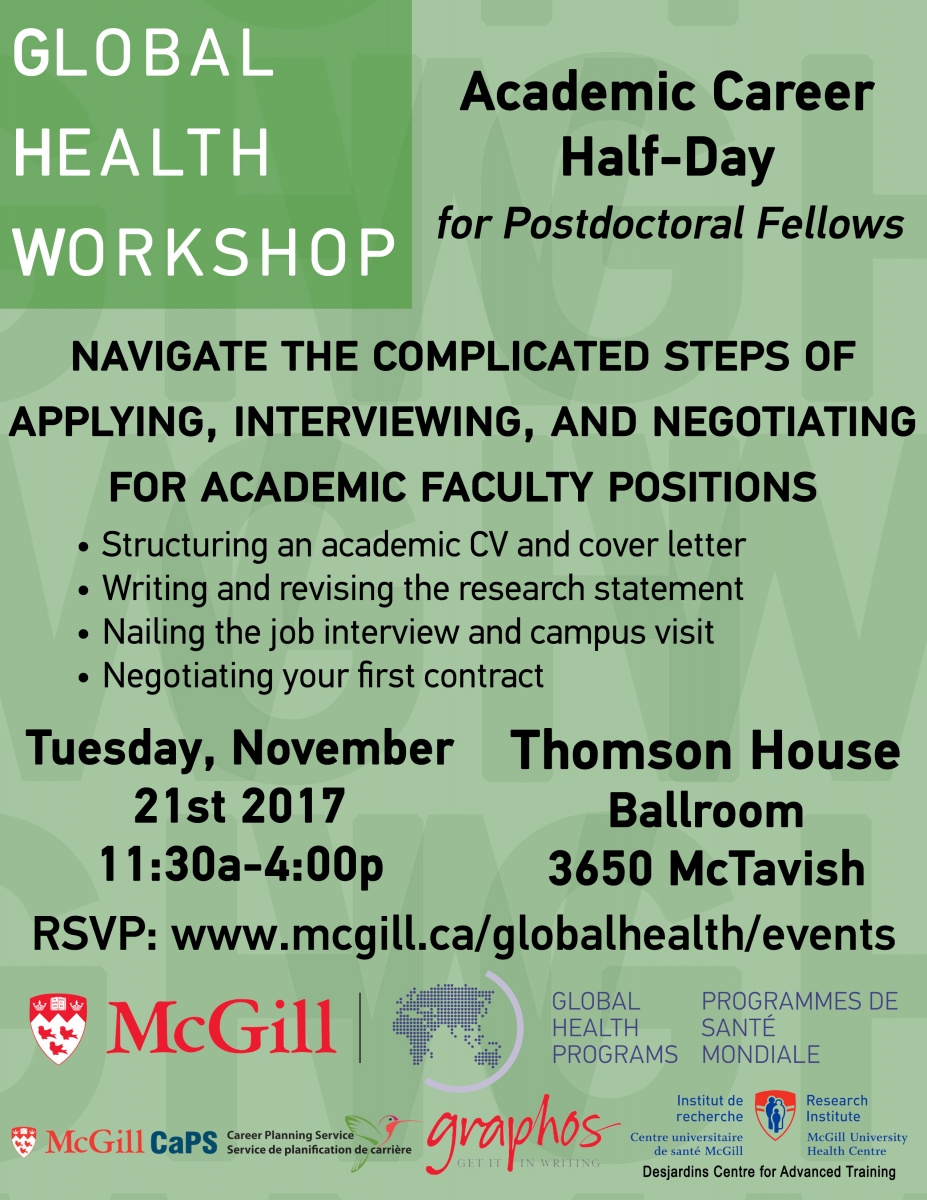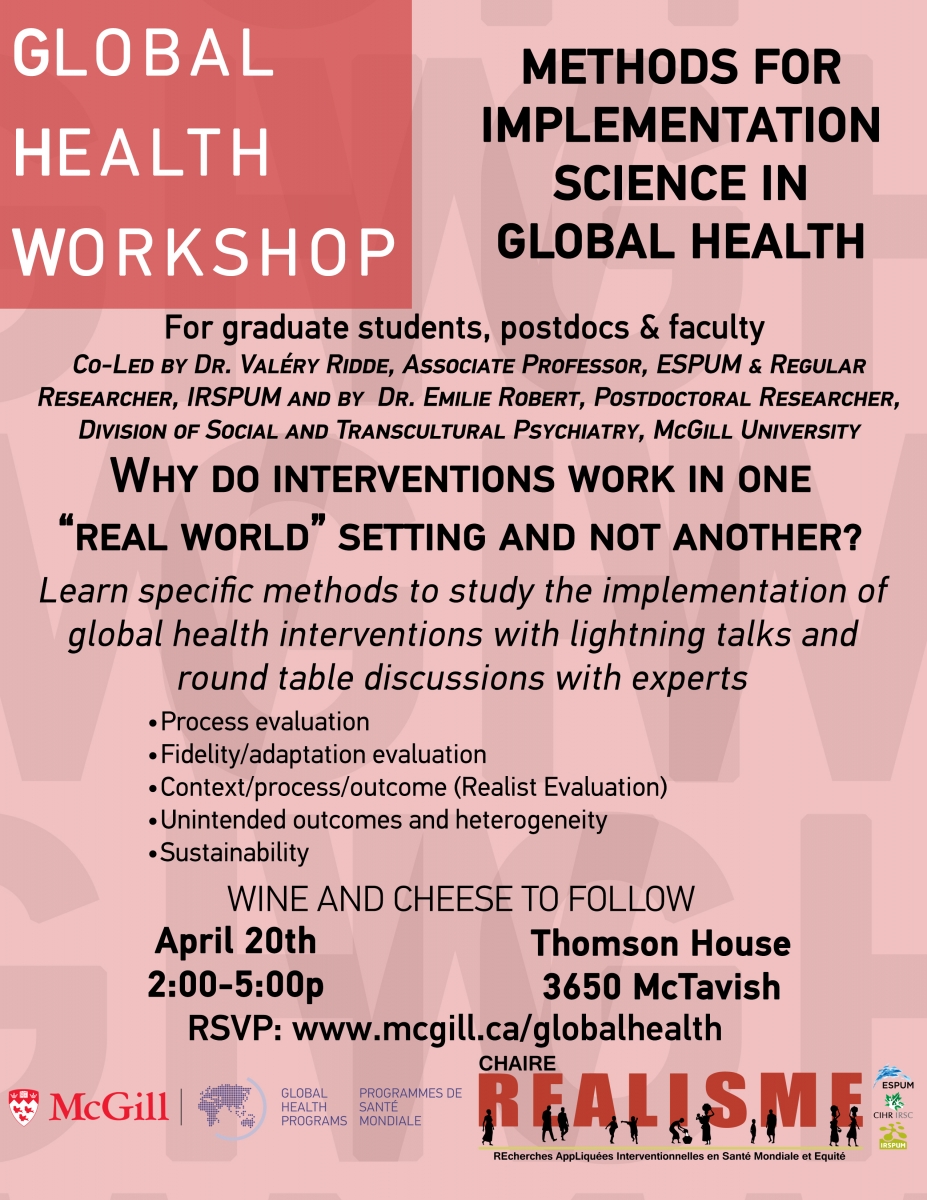- Sharing your Research and Telling Your Story (so people will hear it)
- Personal Branding: Making you and your research stand out
- Academic Career Half-Day for Postdoctoral Fellows
- Methods For Implementation Science in Global Health
- Advanced Grantsmanship for Postdoctoral Fellows
- Operational Research Methods Course
- Impact Evaluation Workshop
 Sharing your Research and Telling Your Story
Sharing your Research and Telling Your Story
(so people will hear it)
McGill Global Health Programs has partnered with the Pulitzer Center on Crisis Reporting to bring the McGill global health community a workshop on tips and tools for engaging the news media. Alongside global health journalists and communications specialists, participants will learn the skills needed to pitch a story, translate to a lay audience, and make both traditional and nontraditional media work for you.
*This workshop follows the Personal Branding: Making you and your research stand out workshop for postdocs scheduled for April 25th, 2018 which focuses on building an online identity and presenting their research data in an attractive manner. PDFs are invited to attend both sessions.
|
9:00AM: Welcome |
Madhukar Pai, McGill Global Health Programs Director |
|
9:05AM: Introduction |
Rebecca Kaplan, Mellon/ACLS Public Fellow, Education Specialist, Pulitzer Center on Crisis Reporting |
|
9:30AM: Communicating Complex Data |
Seema Yasmin, multimedia reporter and John S. Knight journalism fellow at Stanford University |
|
10:40AM: Break |
|
|
10:50AM: Sharing Stories in an Ethically Responsible Manner |
Allison Shelley, Photographer-Pulitzer Center grantee |
|
12:00PM: Lunch |
|
|
12:45PM: Working with Journalists and Storytellers |
André Picard, Health Columnist, The Globe and Mail Barbara Karuana, Filmmaker and Jeanne Sauvé Public Leadership Fellow David M. Secko, Chair of Journalism and Associate Professor, Department of Journalism & Centre for Structural and Functional Genomics, Concordia University Rebecca Kaplan, Mellon/ACLS Public Fellow, Education Specialist, Pulitzer Center on Crisis Reporting |
|
2:00PM: Using New Media (Social Media, Data Visualization, podcasts, blogs, etc.) |
Laurie Devine and Vincent Allaire, McGill University Media Relations Office Madhukar Pai, McGill Global Health Programs Director |
|
3:15PM: Closing |
Rebecca Kaplan, Mellon/ACLS Public Fellow, Education Specialist, Pulitzer Center on Crisis Reporting |
Personal Branding: Making you and your research stand out
 Presented by McGill Global Health Programs, the Desjardins Centre for Advanced Training, and Graphos.
Presented by McGill Global Health Programs, the Desjardins Centre for Advanced Training, and Graphos.
In this postdoc-focused workshop, participants will learn:
- how to develop a personal narrative to help distinguish themselves as researchers/leaders outside their PI’s lab.
- about social media and other tools that can be used to deliver messages about their work.
- how to present data in an appealing way and how to identify appropriate software tools.
- how the McGill Media Relations Office can help publicize their research and expertise.
This workshop precedes the April 27th Global Health Workshop: Sharing your Research and Telling Your Story (so people will hear it) presented in collaboration with the Pulitzer Center for Crisis Reporting. This workshop will be open to McGill Faculty and their trainees and will focus on engaging the news media. PDFs are invited to attend both sessions.
|
10:00AM: Welcome Remarks |
|
| 10:05AM: Cultivating your online presence |
Dr. Casey McCormick, Course Lecturer, Department of English, McGill University Dr. Yvonne Hung, Graduate Program Coordinator, Graphos |
| 11:00AM: Supporting your message with a platform |
Dr. Tina Gruosso, Postdoctoral fellow, Laboratory of Dr. Morag Park, Goodman Cancer Research Centre, McGill University and Joint Winner, The Principal’s Prize for Public Outreach Through Media, Graduate Student Category Dr. Emily Bell, Manager,Desjardins Centre for Advanced Training of the RI-MUHC and Ms. Stephanie Laroche-Pierre, Senior Administrative Coordinator, McGill Global Health Programs |
| 12:00PM: Lunch | |
|
12:20PM: How do you communicate your data in an appealing way? |
Mr. Roberto Rocha, Digital and data journalist, CBC/Radio-Canada |
| 1:35PM: How can McGill support sharing your research? |
Mr. Jason Clement,Communications Officer, McGill Faculty of Medicine |
| 2:00PM: Closing remarks |
Academic Career Half-Day for Postdoctoral Fellows
Presented by McGill Global Health Programs, the Desjardins Centre for Advanced Training, Graphos and Career Planning Service
This half-day will help postdoctoral fellows and trainees in the health sciences navigate the complicated steps of applying, interviewing, and negotiating for academic faculty positions.
*This academic career half-day precedes the Career Half-Day for Trainees, scheduled for November 24, 2017 (which focuses on non-academic careers where the agenda includes a morning workshop on hiring practices and a networking lunch with professionals). PDFs will be encouraged to attend both sessions.
 Topics:
Topics:
- Structuring an academic CV and cover letter
- Writing and revising the research statement
- Nailing the job interview and campus visit
- Negotiating your first contract
Learning goals:
By the end of this half-day, postdoctoral fellows will be able to:
- Prepare an academic CV and cover letter that is organized and formatted for a specific job posting to a department or university
- Apply writing strategies to draft and revise a research statement
- Describe potential job interview scenarios and plan for the job talk
- Recognize factors important in the negotiation of an academic faculty position and identify ways to prepare for the negotiation process
What should postdoctoral fellows bring with them:
- A research summary from a fellowship or grant application (that could be used or referenced in the session offered by Graphos), printed copy
- A pen and paper or computer
| Schedule | Title | Speaker / Format |
|---|---|---|
|
11:30 a.m. – 11:45 a.m. |
Welcome (Lunch provided) |
|
|
11:45 a.m. – 12:30 p.m. |
The Academic CV and Cover Letter |
Susan Molnar, CaPS |
|
12:30 p.m. – 1:45 p.m. |
Writing and Revising Your Research Statement |
Dr. Yvonne Hung, Graduate Program Coordinator, Graphos and |
|
1:45 p.m. – 2:00 p.m. |
Break | |
|
2:00 p.m. – 2:45 p.m. |
Taking the Mystery Out of the Academic Job Talk The structure(s) of the academic interview and job talk Top 5 tips for the job talk |
Dr. Madhukar Pai, Director, McGill Global Health Programs |
|
2:45 p.m. – 3:30 p.m. |
Exercise: Job talk outline Discussion of different job talk outlines that PDFs have come up with in small groups and as a large group. |
Dr. Emily Bell, Manager, Desjardins Centre for Advanced Training of the RI-MUHC Dr. Jill Baumgartner, Assistant Professor, Department of Epidemiology, Biostatistics, and Occupational Health |
|
3:30 p.m. – 4:00 p.m. |
The Negotiation for the Academic Job Interview What is being negotiated Factors to keep in mind as the candidate Ways to prepare, get informed for the negotiation process How to overcome typical fears in negotiating |
Dr. Jill Baumgartner, Assistant Professor, Department of Epidemiology, Biostatistics, and Occupational Health |
Methods For Implementation Science in Global Health
McGill Global Health Programs is proud to partner with the Université de Montréal Chair REALISME (Interventional applied research in global health and equity).
 Implementation science is not implementation research (use of evidence for intervention); it is about mobilizing theories, concepts and methods to better understand what, why, and how interventions work in a "real world" setting (Ridde V. BMJ Glob Health 2016;1:e000115). But it is more easily stated than accomplished!
Implementation science is not implementation research (use of evidence for intervention); it is about mobilizing theories, concepts and methods to better understand what, why, and how interventions work in a "real world" setting (Ridde V. BMJ Glob Health 2016;1:e000115). But it is more easily stated than accomplished!
This half-day workshop will be the opportunity for trainees and students to learn from their peers how to mobilize specifics methods to study the implementation of global health interventions. The workshop will be divided in 3 parts. After an introductory lecture, the second part will be organized around a series of short (8-10’ talk) presentations by students and researchers who will focus on methods used and put forward their reflexive thinking about using these methods. The second part will consist of a world coffee session where participants will have the opportunity to discuss and share experience with each of the presenters.
Program
OPENING REMARKS - Matthew Hunt (McGill University)
INTRODUCTION - Valéry Ridde (Université de Montréal)
Definitions, history, theory based-evaluation, intervention theory and Template for Intervention Description and Replication (TiDier), Proctor framework, case studies, spatial, etc methods presented today and others (ideas, mixed methods, costs), workshop outline and organization
LIGHTNING TALKS
Each short presentation will cover:
- Context and description of the intervention
- Research objectives
- Description of the method used, rational
- Findings
- Strengths, limitations, challenges of the method
1-Process evaluation
- Combining two frameworks to analyze a knowledge brokering strategy : Consolidated framework for advancing implementation science (CFIR) and Ecological framework (EF): Esther McSween-Cadieux (Université de Montréal)
- Leadership and motivation : a multi-level approach: François Chiocchio (University of Ottawa)
- Ethic and process evaluation : Matthew Hunt (McGill University)
- Multiple streams framework (MSF) to analyze the health social protection program implementation in Burkina: Kadidiatou Kadio (Université de Montréal)
- The TIDieR Checklist (Template for Intervention Description and Replication) : A useful tool for scoping/systematic reviews : Stéphanie Degroote (Université de Montréal)
2-Fidelity/adaptation evaluation
- Fidelity/adaptation framework and dengue community based intervention in Cuba : Dennis Pérez Chacón (Université de Montréal)
- Comparison of registered and published intervention fidelity assessment in cluster randomized trials of public health interventions in low to middle income countries (LMIC) : Nanor Minoyan and Myriam Cielo (Université de Montréal)
3-Context/process/outcome (Realist Evaluation)
- Looking at implementation: how useful is realist evaluation?: Emilie Robert (McGill University)
4-Unintended outcomes and heterogeneity
- Using the Diffusion of Innovation Theory to Study the Unintended Consequences of Health Interventions: Anne-Marie Turcotte-Tremblay (Université de Montréal)
- Qualitative case study method to understand the heterogeneity of effects of a health policy in Burkina Faso: Loubna Belaid (Université de Montréal)
- Spatial heterogeneity and intervention effects: Kate Zinszer (Université de Montréal) and Emmanuel Bonnet (Institut de recherche pour le développement)
5-Ownership and Sustainability
- Using the policy diffusion framework to investigate domestic actors’ ownership of performance-based financing in Mali : Lara Gautier (Université de Montréal)
- A case study approach to comprehend sustainability's framework: Mathieu Seppey (Université de Montréal)
ROUNDTABLE DISCUSSIONS WITH EXPERTS
CONCLUSION
WINE AND CHEESE
Advanced Grantsmanship for Postdoctoral Fellows
 McGill Global Health Programs is proud to partner with McGill SKILLSETS and Graphos to bring you the first in a series of workshops targeted to McGill postdocs working in a global health field.
McGill Global Health Programs is proud to partner with McGill SKILLSETS and Graphos to bring you the first in a series of workshops targeted to McGill postdocs working in a global health field.
This first workshop will focus on Advanced Grantsmanship and will be held over two days on April 11 and 13, 2017 between 11:30AM and 4:00PM. A light lunch will be served both days.
Workshop Description:
April 11: Postdocs will benefit from experts (Dr. Heidi Hoernig, Professor Madhukar Pai) who will share how to develop and write a successful research narrative with the funding agency and review committee in mind.
Drawing from Graphos's experience in offering fellowship writing support, we have partnered with Global Health and Skillsets to develop the interactive grantwriting portion on April 11. The workshop will be facilitated by Dr. Heidi Hoernig (Centre for the Study of Democratic Citizenship), who has provided strategic and pre-award support for over 400 grant applications across the social sciences, humanities and health sciences.
April 13: Postdocs will learn how to avoid budgeting pitfalls (Dr. Nil Basu), supporting global health work through donor and foundation funds (Ms. Melissa Poueymirou) and how to transition from proof of concept and transition to scale research (Dr. Charles Larson).
Schedule - Day 1
April 11th 11:30am-4:00pm
|
11:30-11:45 |
Welcome |
Lunch provided |
|---|---|---|
|
11:45-1:15 |
“To apply or not to apply? Understanding funding agencies and tailoring your research to the right funding opportunity”
Speaker: Dr. Heidi Hoernig |
|
|
1:15-1:30 |
Break |
Coffee and snack provided |
|
1:30-3:15 |
“Grant writing 500: Adapting your research and weaving a coherent narrative across the application”
Speaker: Dr. Heidi Hoernig |
|
|
3:15-4:00pm |
“Keeping the review committee in mind”
Speaker: Dr. Madhukar Pai |
Schedule - Day 2
April 13th 11:30am-4:00pm
|
11:30-11:45 |
Welcome |
Lunch provided |
|---|---|---|
|
11:45-1:15 |
“Avoiding pitfalls in the budgeting and administration section”
Speaker: Dr. Nil Basu |
|
|
1:15-2:15pm |
“Supporting global health work through donor and foundation funds”
Speaker: Melissa Poueymirou |
|
|
2:15-2:30pm |
Break |
Coffee and snack provided |
|
2:30-3:15pm |
“OK, now what? Transitioning to scale grants”
Speaker: Dr. Charles Larson |
|
|
3:15-4:00pm |
Closing and evaluation |
Our speakers- Day 1
Heidi Hoernig, Academic Associate, Centre for the Study of Democratic Citizenship, McGill University and Consultant
Heidi Hoernig is a research development professional with seven years’ experience at McGill University providing strategic and pre-award support to research development and funding. She has supported the development and submission of more than 400 grant applications to provincial, national and international agencies and foundations by McGill faculty members across the social sciences, humanities and health sciences. She holds a PhD in Planning from the University of Waterloo and was a SSHRC postdoctoral fellow at INRS.
Madhukar Pai, Professor of Epidemiology, McGill University, Director, McGill Global Health Programs, Associate Director, McGill International TB Centre, Canada Research Chair in Translational Epidemiology & Global Health
Madhu Pai did his medical training and community medicine residency in Vellore, India. He completed his PhD in epidemiology at UC Berkeley, and a postdoctoral fellowship at the UCSF. He is currently a professor of epidemiology at McGill University in Montreal. He serves as the Director of Global Health Programs, and as an Associate Director of the McGill International TB Centre. In addition, he serves as a Consultant for the Bill & Melinda Gates Foundation. He also serves on the Scientific Advisory Committee of the Foundation for Innovative New Diagnostics, Geneva. Madhu has previously served as co-chair of the Stop TB Partnership's Working Group on New Diagnostics. He is on the editorial boards of Lancet Infectious Diseases, PLoS Medicine, International Journal of TB and Lung Disease, among others.
Madhu’s research is mainly focused on improving the diagnosis and treatment of tuberculosis, especially in high-burden countries like India and South Africa. His research is supported by grant funding from the Gates Foundation, Grand Challenges Canada, and Canadian Institutes of Health Research. He has more than 200 peer-reviewed publications. He is recipient of the Union Scientific Prize, Chanchlani Global Health Research Award, and Stars in Global Health award from Grand Challenges Canada. In 2014, he was selected as a member of the Royal Society of Canada’s College of New Scholars, Artists and Scientists.
Our speakers- Day 2
Dr. Nil Basu, Associate Professor; Canada Research Chair in Environmental Health Sciences
Dr. Nil Basu is the recent recipient of the $9.6M grant from Genome Canada and a $3M NIH/IDRC grant for his work in environmental health. He holds a Canada Research Chair (CRC) in Environmental Health Sciences and is an Associate Professor in the Faculty of Agricultural and Environmental Sciences. He is jointly appointed in the Department of Natural Resource Sciences and in the School of Dietetics and Human Nutrition. He is also an Associate Member in the McGill University Department of Epidemiology, Biostatistics and Occupational Health.
Melissa Poueymirou Director, Foundation Relations, University Advancement
Biography coming soon
Charles Larson, National Coordinator, Canadian Coalition for Global Health Research (CCGHR)
Born and raised in Tacoma, Washington, Dr. Larson moved to Montreal to study medicine at McGill University. He subsequently specialized in Pediatrics and Preventive Medicine & Public Health. His global health career began in the late 1980s when he joined the McGill-Ethiopia Strengthening Community Health Project, which he directed from 1989 to 1992. Since 2008, he has been a Professor of Pediatrics at the University of British Columbia and Director of the BC Children's Hospital-Centre for International Child Health (CICH) from 2008 to 2015. The CICH currently carries out capacity building and research projects in Bangladesh, China, Uganda, India and Senegal. Prior to joining UBC he lived in Dhaka, Bangladesh for 6 years where he directed the Health Systems and Infectious Diseases Division at the International Centre for Diarrheal Diseases Research, Bangladesh. He also led a five-year McGill University population child health project in Chelyabinsk, Russia from 1998 to 2003. Frm 2011 to 2016 he has been the PI on a Muskoka Initiative grant being carried out in rural Bangladesh, titled “Interrupting pathways to Maternal, Newborn and Early Childhood Sepsis". Dr. Larson’s interests currently focus on implementation studies, including research in support of the scale up of zinc treatment of childhood diarrhea and interventions that address the early detection, referral, treatment and follow-up management of sepsis in newborns and young children. Charles is a past Board of Directors Chair of the Canadian Society for International Health and currently the National Coordinator of the Canadian Coalition for Global Health Research.
Our Partners
Graphos offers courses, workshops and other writing support to help graduate students and postdocs become more efficient, precise and effective scholarly communicators. With regard to grantwriting, we have offered fellowship writing workshops for graduate students and postdocs both downtown and at the MUHC. We have also worked with Graduate Funding (GPS) to provide tailored support for Vanier CGS and Banting Postdoctoral applicants. Drawing from this experience, we are pleased to work with Dr. Heidi Hoernig (Centre for the Study of Democratic Citizenship) to develop the advanced grantwriting sessions on April 11.
Operational Research Methods Course
 May 4-8 2015
May 4-8 2015
9:00am- 12:00pm
Education Building Room 216
McGill University
3700 Rue McTavish, Montreal Quebec, H3A 1Y2
This 5 day course on Operational Research will provide an overview of the what, why and how of operational research. It will include the WHO, The Union and MSF and will focus on the Structured Operational Research and Training Initiative (SORT-IT); how to develop an operational research protocol; use Epidata for quality assured data capture and analysis; how to write an operational research paper and get it accepted in peer reviewed scientific journals and how to use evidence from operational research to change policy and practice. The target audience is Masters and/or Doctoral students interested in Global Health, especially those who plan to work with public health programs in low and middle income countries.
Impact Evaluation Workshop
 January 19, 2015
January 19, 2015
Dr. Jack Colford’s (UC Berkeley) 4-hour workshop on impact evaluation methods and pitfalls drew an audience of nearly 150. Among the topics touched in this engaging workshop were step wedged design, different options for randomization, and retrospective impact evaluation. An article overviewing the talk can be found on Healthy Inference (McGill University epidemiology students' blog).

